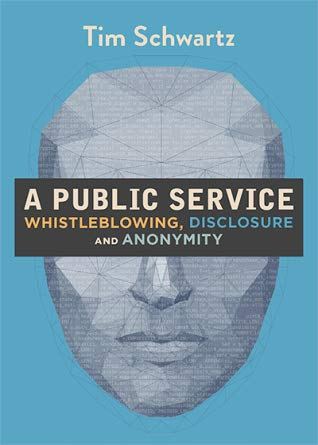By Boing Boing
In A Public Service, activist/trainer Tim Schwartz presents the clearest-ever guide to securely blowing the whistle, explaining how to exfiltrate sensitive information from a corrupt employer – ranging from governments to private firms – and get it into the hands of a journalist or public interest group in a way that maximizes your chances of making a difference (and minimizes your chances of getting caught).
Parts of A Public Service read like a spy thriller, covering detailed operational security planning – everything from buying a burner phone to doing research into possible journalists to take your docs to – all without leaving a trail that can be traced back to you.

Schwartz draws on the lessons of whistleblowers who remained anonymous (like the Panama Papers’ John Doe); to those who got away with it, more or less (like Edward Snowden); to those who ended up in jail for their bravery (like Reality Winner).
Schwartz goes over their planning and execution with a fine, forensic lens, making it clear where they were smart, where they were lucky, and where their luck or their planning failed them.
Every technical lesson is presented in clear, easy-to-follow terms – and more importantly, this technical material is embedded in super-sharp context explaining how to assess your risks and use your technological information to counter them.
Schwartz begins at the beginning, with steps for getting data out of a network without leaving signs that point to you, and then carries on through the whistleblowing process – sanitizing identifying information in the files, securely transmitting them, and then covering any trace of your possession.
Just as important are Schwartz’s chapters on how to figure out who you should leak your documents to, and then how to contact them in a way that is likely to get your leaks taken seriously enough to rate a follow-up (both public interest groups and journalists get far more tips than they can handle, so this is every bit as important as the security advice).
He also discusses when you might expect to have to go public – as with a workplace sexual assault accusation, say – and how to prepare yourself both mentally and technologically for the inevitable fallout.
The book ends with a chapter of sample cases and a chapter of advice to journalists and public interest groups who might want to receive leaks of this sort, explaining how to be a good steward of that information and a safe haven for leakers.
This is an outstanding, simple guide to a daunting and vital subject. Schwartz has done outstanding work explaining the ethical, personal, technical and legal considerations in blowing the whistle.
–
From the publisher:
“Governments and corporations now have the tools to track and control us as never before. In this whistleblowing how-to, we are provided with tools and techniques to fight back and hold organizations, agencies, and corporations accountable for unethical behavior.
“Can one person successfully defy a globe-spanning corporation or superpower without being discovered? Can a regular citizen, without computer expertise, release information to the media and be sure her identity will be concealed?
“At a time we’re told we are powerless and without agency in the face of institutions such as Google, Facebook, the NSA, or the FBI, digital security educator Tim Schwartz steps forward with an emphatic ‘yes.’ And in fewer than 250 pages of easy-to-understand, tautly written prose, he shows us how.
“A Public Service can teach any one of us the tricks to securely and anonymously communicate and share information with the media, lawyers, or even the U.S. Congress.
“This book is an essential weapon in the pervasive battle to confront corruption, sexual harassment, and other ethical and legal violations.”
–
The author is also an artist.
–
Plus:
I wrote a blurb for @timatron‘s excellent new book A Public Service, a practical guide for how to blow the whistle as safely as possible!
If you need to avoid leaving a metadata trail about your interest in this topic, make sure to buy at a physical bookstore and pay with cash pic.twitter.com/FBcCvUMgJS
— Micah Lee (@micahflee) December 27, 2019
Posted on January 10, 2020


